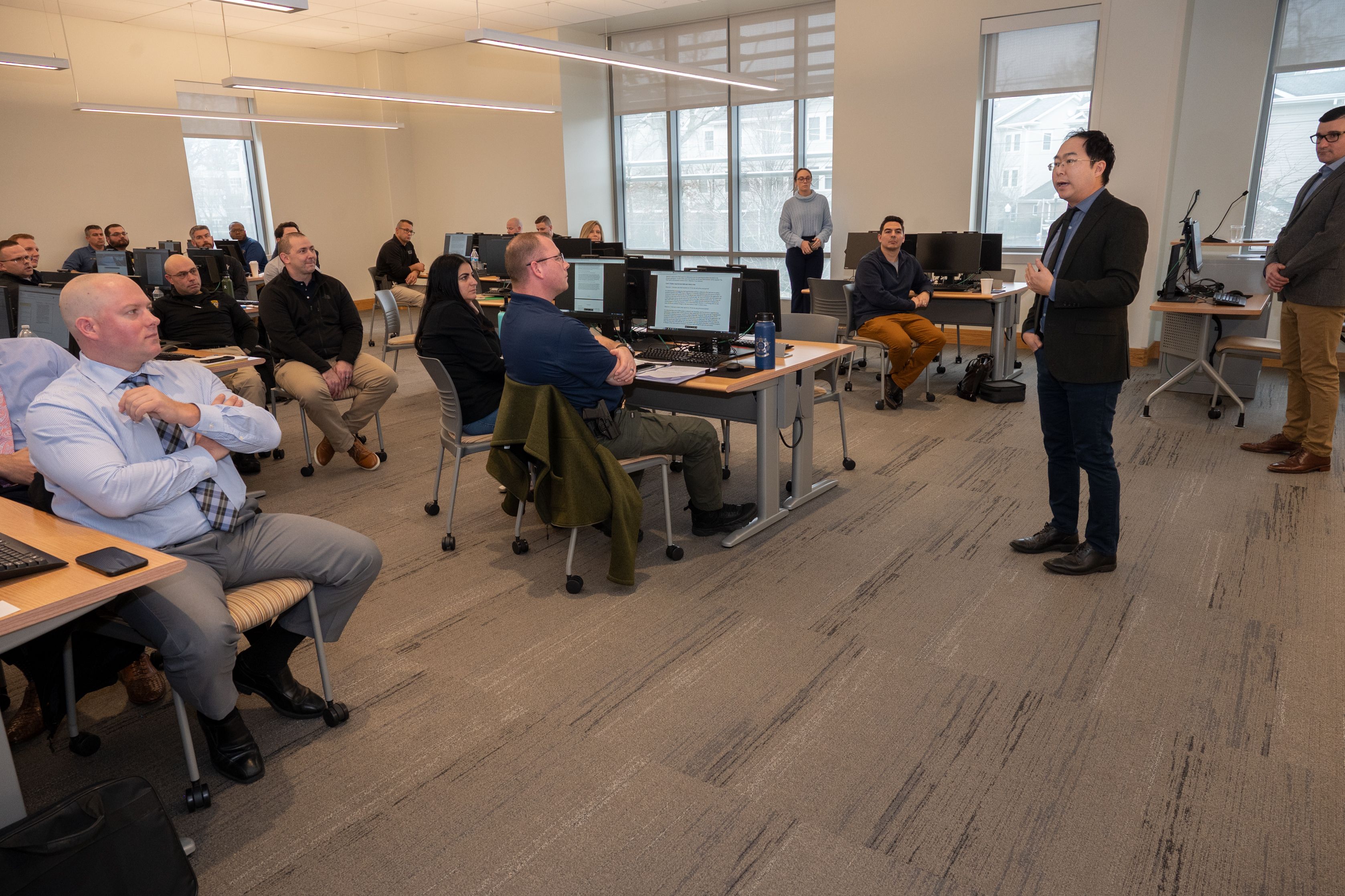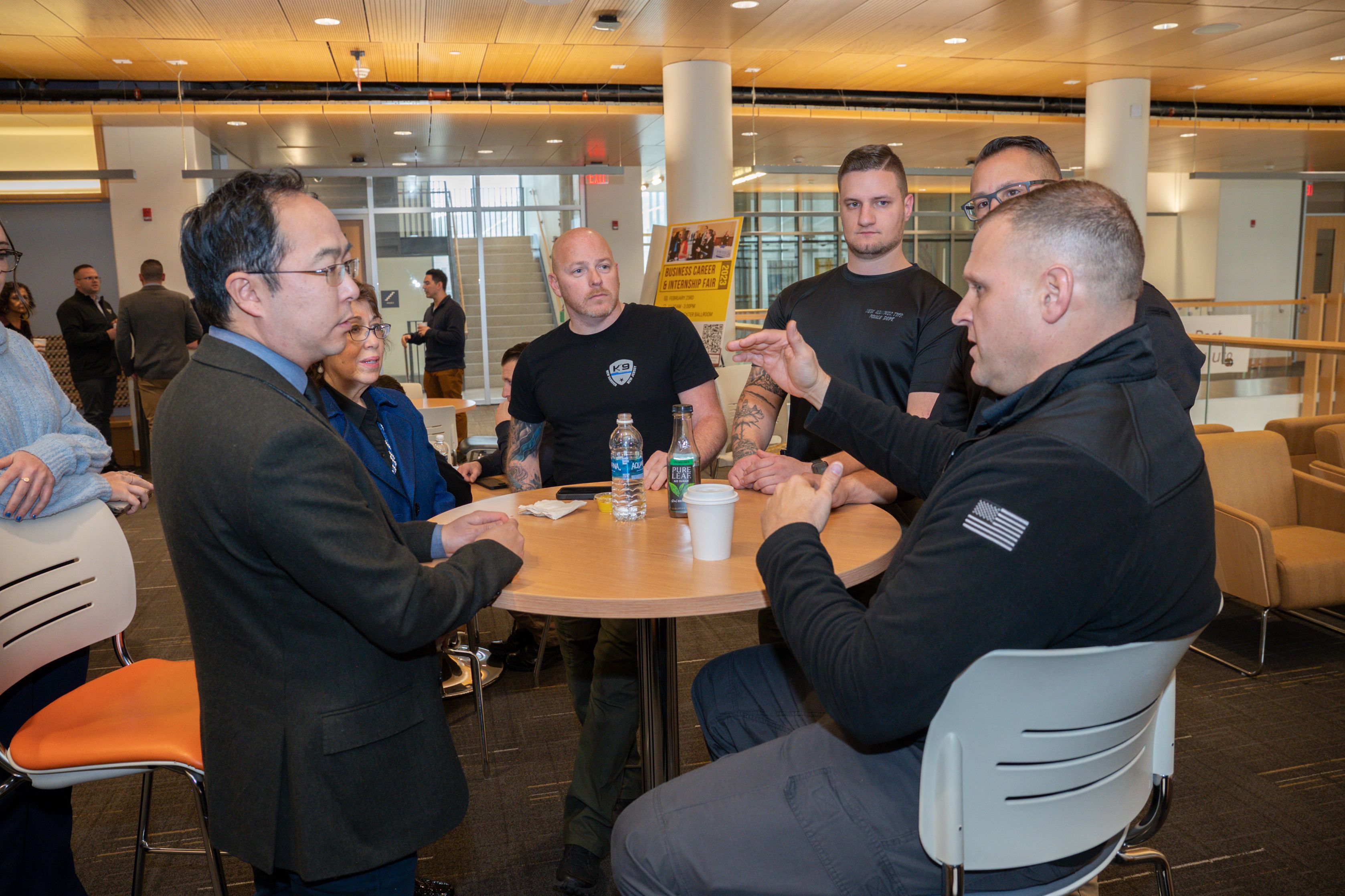Police officers complete grant writing course coordinated by Rowan, Congressman Andy Kim’s office
Police officers complete grant writing course coordinated by Rowan, Congressman Andy Kim’s office

Thirty officers from 25 South Jersey police departments learned how to write effective grant proposals during a two-day course at Rowan University Jan. 12-13.
The course, presented by law and justice studies professors in the College of Humanities & Social Sciences, was developed after officials from the office of Congressman Andy Kim (D-3rd) asked Rowan to consider a class to help police agencies gain resources to help them better serve their communities.
“To get you as many resources as possible would be a win-win for all of us,” Kim told officers who attended the course in Rowan’s Business Hall on Friday, Jan. 13. “We want to help you do your jobs as efficiently and effectively as possible. We are ready to work with each and every one of you.”
Kim’s staff includes Senior Advisor/Director of Grants Lynette Whiteman, who worked with Rowan to set up the grant-writing course.
 Led by Associate Professors of Law & Justice Studies Evan Sorg and John Shjarback, the course covered key aspects of grant writing—from identifying needs and funding to accessing academic literature to the writing process. (Above are, from left, CHSS Dean Nawal Ammar, Sorg, Kim, Shjarback and Rowan Provost Tony Lowman.)
Led by Associate Professors of Law & Justice Studies Evan Sorg and John Shjarback, the course covered key aspects of grant writing—from identifying needs and funding to accessing academic literature to the writing process. (Above are, from left, CHSS Dean Nawal Ammar, Sorg, Kim, Shjarback and Rowan Provost Tony Lowman.)
“There are millions and millions of (grant) dollars every year between the federal and state governments,” said Sorg, a former New York City police officer. Sorg has served as a grant reviewer for the Department of Homeland Security and was contracted by the New Jersey State Police to complete a statewide gang assessment as part of a $2.1 million COPS Anti-Gang Initiative Grant in 2016.
Private agencies, such as the Firehouse Subs Public Safety Foundation, also provide grant funds for equipment, prevention education, scholarships, disaster relief and supports for military members, he noted.
Departments may seek grants for items such as Automated License Plate Readers, an ATV for better crowd control, or a kennel for a K-9 officer, he said.
“Those items can absolutely positively impact the safety in a community,” said Sorg, who urged officers to be proactive in their approach to seeking grants and to think strategically as they write.
Shjarback, whose research centers on American policing with a focus on environmental and organizational influences on officer behavior and attitudes, said many police departments already are stretched too thinly. But grant funding can make a real impact on a community, even if the funds help provide assistance for more officers or better technology, he said.
“Any grant that can help them hire more or get more technology can put a department in a better position to help the towns they serve--allowing them to be more proactive in solving problems and improving community engagement."
 Riverton Police Lieutenant Andrew Beuschel knows that first hand. He wrote and secured a $6,200 New Jersey Traffic Safety Grant last year. The grant provided for traffic equipment—cones, barricades, and a trailer—for the borough of 3,800 residents.
Riverton Police Lieutenant Andrew Beuschel knows that first hand. He wrote and secured a $6,200 New Jersey Traffic Safety Grant last year. The grant provided for traffic equipment—cones, barricades, and a trailer—for the borough of 3,800 residents.
“Police work is very challenging. We are asked to do a lot of different things and grant writing falls by the wayside in every department. We don’t have the funds to hire a grant writer,” said Beuschel, who completed the Rowan course.
Riverton, which has five police officers, often hosts large celebrations. Its Fourth of July celebration attracts as many as 10,000 people to the borough, Beuschel said. The traffic equipment has been vital for traffic and crowd control, he said.
“If it helps our police department and helps our citizens enjoy our town, it’s a success,” Beuschel said.